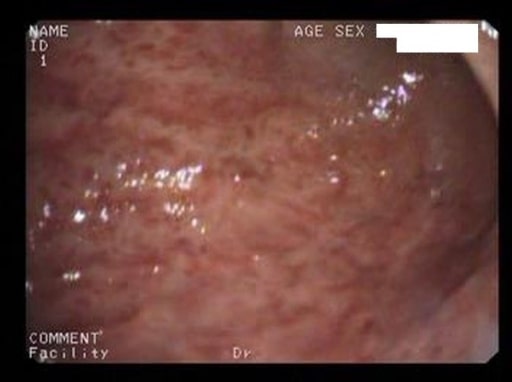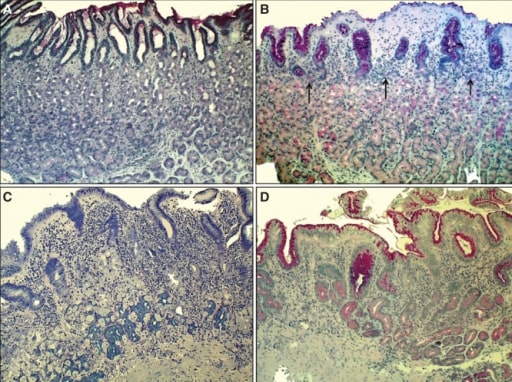Playlist
Show Playlist
Hide Playlist
Autoimmune and Chronic Gastritis
-
Slides Stomach and Duodenum.pdf
-
Download Lecture Overview
00:01 Let's move on to gastritis. With gastritis we first begin by looking at type A gastritis. 00:09 And the reason that I specifically did not mention autoimmune right now is because gastritis, in a chronic nature there are two types. Type A and type B. Once again, when you do gastritis, you'll divide it into acute and chronic. The acute is easy. The acute, we're dealing with a long term NSAID use. Maybe the patient was drinking alcohol for a long period of time. Acute gastritis. 00:44 But what I'm saying is those offending agents were taken for a long period of time resulting in acute gastritis. And then we move in to chronic gastritis. With chronic gastritis, there is type A and type B. You take the A in type A and use it to your advantage to then call it autoimmune gastritis. 01:11 Autoantibodies attacking your parietal cell. Welcome to pernicious anemia causing chronic type A gastritis. 01:25 Pernicious anemia. Knocking out the parietal cell. Absolutely knocks out the acid. We call this achlorhydria. 01:35 Achlorhydria, couple of differentials you want to keep in mind. VIPoma, Plummer-Vinson syndrome, and obviously pernicious. Along with no acid there is no intrinsic factor. Your patient is now rendered B12 deficient. Keep this B12 deficiency caused by pernicious anemia separate from all other B12 deficiencies. 02:01 By all others I mean maybe a patient, elderly, nursing home, vegan for years, maybe out in the lakes. 02:13 In the great lakes there is a fish tapeworm called Diphyllobothrium latum. Maybe there was Crohn's disease with damage to the terminal ilium. You see, you get my point. Keep this separate from all others. 02:29 Achlorhydria and B12 deficiency, oh no doubt this is pernicious anemia. Anti-parietal cell antibodies now not only is it anti-parietal cell antibody, also keep in mind, remember this is autoantibodies, right. These autoantibodies can prety much attack whatever that it wants in that particular system. 02:52 What am I getting at. For example if it's Hashimoto, don't you ever forget those autoantibodies not only could they affect your thyroid peroxidase but those autoantibodies could also attack your thyroglobulin. 03:06 Same concept here. Clinically often times the autoantibodies not only would they affect the parietal cells technically but because results in B12 deficiency. It may have autoantibodies that attacking your intrinsic factor is my point. Autoimmune diseases. Whenever there is one autoimmune disease, there are many others that you'll always want to keep in mind. What are they? Well it could be any of them. Rheumatoid arthritis, Sjogren, maybe Hashimoto, so on and so forth. It is associated with carcinoid tumor, gastric metaplasia and gastric adenocarcinoma. Very important for you to pay attention to that. Primary gastric adenocarcinoma associated with pernicious anemia. 03:56 Chronic gastritis type A. Think about where your parietal cells are located. Your parietal cells are located in the fundus. And so therefore that's what you're focusing upon here more so. 04:09 Specifically, could it be the antrum? Yes. But because parietal cells are located in the fundus and the body, really you're looking at anywhere in the stomach but could it occur in the antrum? Sure. 04:21 However, type B referring to Helicobacter pylori. B. HelicoBacter, type B chronic gastritis which only only love to live or prefer to live in the distal portion of the stomach by the antrum. 04:43 Therefore your type B would be found with the antrum as being part of chronic gastritis. Once more, just to make sure we're clear. Whenever there is H. pylori, you are extremely worried about those gastric cancers that we talked about. Primary gastric adenocarcinoma or a MALToma, lymphoma. Not going to mention duodenal here.
About the Lecture
The lecture Autoimmune and Chronic Gastritis by Carlo Raj, MD is from the course Stomach and Duodenum Diseases: Basic Principles with Carlo Raj.
Included Quiz Questions
Which of the following results in acute gastritis?
- Chronic NSAID use
- Acute cimetadine overdose
- Acute NSAID use
- NSAID overdose
- Autoimmunity
Cronic type A gastritis has traditionally been associated with...?
- ... pernicious anemia.
- ...chronic NSAID use.
- ...chronic alcohol abuse.
- ...chronic tobacco use.
In what percentage of individuals with chronic type A gastritis are anti-parietal antibodies found?
- 90%
- 60%
- 70%
- 80%
- 100%
Customer reviews
5,0 of 5 stars
| 5 Stars |
|
5 |
| 4 Stars |
|
0 |
| 3 Stars |
|
0 |
| 2 Stars |
|
0 |
| 1 Star |
|
0 |





